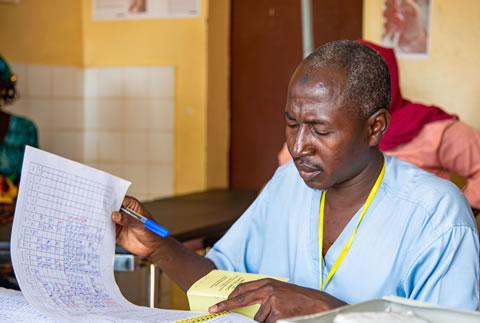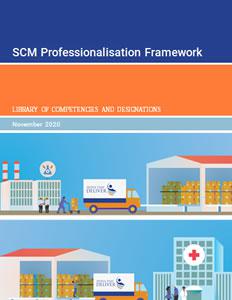
Evidence-based solutions
As the technical leader in human resources (HR) for health supply chain management (SCM), PtD developed several foundational concepts and approaches, as well as specific HR for SCM resources and tools to support country-level health supply chain workforce development. These tools were developed in collaboration with PtD coalition members, advisors, donors and consultants, the collective knowledge and expertise of whom PtD leverages to develop, review and validate all the tools in its repertoire.
In 2018 PtD published its foundational methodology: the Building Human Resources for Supply Chain Management Theory of Change (HR4SCM ToC for short) to describe the impact of interventions and investments in HR for SCM. This approach improves workforce performance which in turn improves the availability of commodities.
A theory of change simply explains the pathway through which a result can be achieved and shows the chain of events that exists between a programme’s interventions, and its goals and desired outcomes.
The HR4SCM ToC was the first of its kind and manages to clearly highlight the link between investments and interventions and their impact on supply chain performance. The HR4SCM ToC enables SC practitioners to understand the steps, or the pathway of change, that connects HR interventions and investments to health SC performance improvements and ultimately to improved health outcomes. The central thread running through the methodology is that the supply chain is critical to the country's health system.
SCM professionalisation framework
In 2021, PtD published the SCM professionalisation framework, which presents a career pathway for health SCM professionals to transform health supply chain management into a recognised profession of the highest integrity.
There is a real need to standardise the skills and competencies required for supply chain roles so that employers in the public and private sectors can recruit the right people with the right qualifications, and so that academic institutions and professional associations can produce the professionals to meet market demand.
PtD in collaboration with USAID, the GHSC-PSM project and SAPICS developed this systematic approach to workforce development. As part of this approach, all practitioners are able to find a career path for growth and development and become supply chain professionals capable of leading and strengthening public and private healthcare supply chains. Crucially the approach considers the development of HR systems as an investment and focuses on long-term solutions to organisational and people development.
The SCM Professionalisation Framework can be used by governments to define standards, employers to define competency needs, learning institutions to define curricula and employees to map careers. This ground-breaking framework includes tools, materials and presentations that establish a set of global standards that align career path, education and professional growth in health supply chain management.
PtD's tools and resources
The table below provides a quick guide to PtD's tools and resources. This list, though, is not exhaustive, and all resources can be found here.
| Tool / Resource | Purpose |
|---|---|
| Competency compendium for health supply chain management (2014) | Guidance on how to create a supply chain management competency frameworks for different cadres of supply chain workers. |
| Health Supply Chain Competency Framework for Managers and Leaders (2014) | A framework containing six domains and 33 competency areas. |
| Library of competencies and designations for health supply chains (2020) | Building on the Competency Compendium from 2014, this serviced-based framework presents seven competency domains that cover the practice of health supply chain management across the public and private sectors. |
| Mapping of education for health supply chains (2020) | This tool aligns SCM job roles with education and training frameworks and includes more than 250 courses from providers around the world. |
| Collection of SC roles and job descriptions (2020) | This tool provides a systematic method to build job descriptions, considering all the SCM roles that exist in health supply chain management. |
| Implementation approach for health supply chains (2020) | An overview of the activities that can be undertaken to engage local stakeholders advocating the need to implement a SCM Professionalisation approach. |
| Workforce optimisation tool (2019) | An Excel-based tool that allows users to model supply staffing under various scenarios. It can also be used to allocate supply chain workers based on differing objective functions . |
| HR4SCM theory of change rapid diagnostic tool with prioritization matrix and facilitator guide (2020) | A rapid assessment of the SC workforce applying PtD’s Human Resources for Supply Chain Management Theory of Change methodology to four pathways: staffing, skills, working conditions and motivation. |
| HR policies package for SC organizations (2020) | The purpose of this package is to set standard policies and practices to ensure fairness and equity, and attract and retain a qualified and committed supply chain workforce. |
| Performance management toolkit for SC organizations (2020) | The toolkit is based on the HR4SCM ToC framework and addresses the specific performance management needs of the health supply chain workforce, including supportive supervision. |
| Training evaluation for the public health supply chain (2018) | This represents the first step towards quantifying the return on investment or the impact of training activities on health supply chain improvements. |

